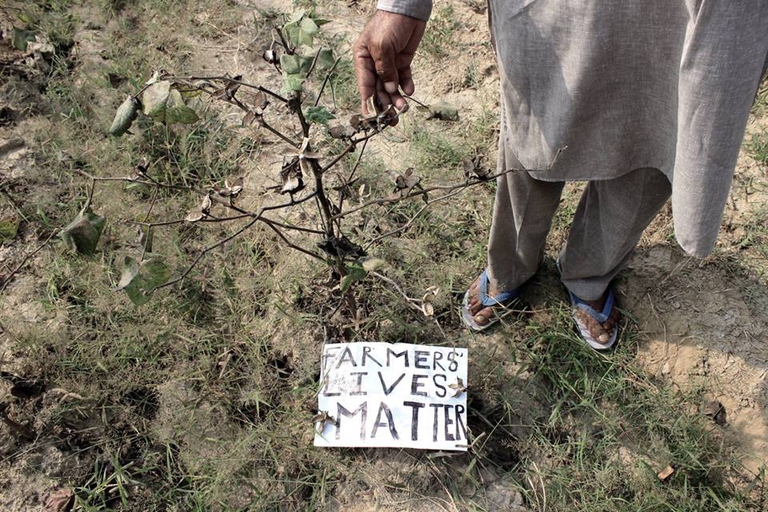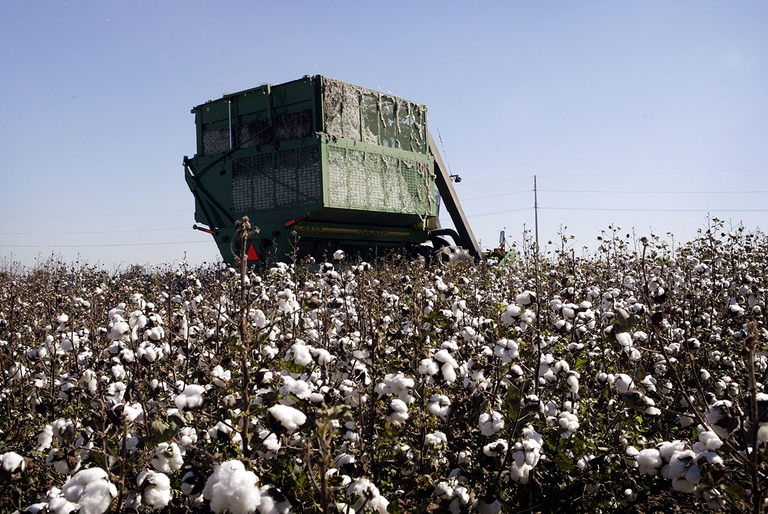
Factory farming conditions and antibiotic-resistant pathogens emerging as a result of them pose an existential threat to humans in the form of zoonotic diseases. Why it’s time to produce and consume food more thoughtfully.
Monsanto has falsely claimed it has been granted a patent on genetically-modified cotton seeds in India. But the Supreme Court ruling has upheld India’s law, which doesn’t allow patents on seeds. The op-ed by Vandana Shiva.
Monsanto has spread the false claim in the media that on the 8th of January 2019 India’s Supreme court “upheld” a Bt cotton seed patent. This is totally false reporting. The Supreme Court order of 8th January 2019 upheld Article 3j of India’s Patent Law, which excludes seeds from patentability. It did not uphold a non-existent “patent on seed” that Monsanto does not and cannot have in India.
The decision overturns an earlier ruling by the Delhi HC that Monsanto — which has been bought by German drug and crop chemical maker Bayer AG — was unable to claim patents on GM cotton seeds.https://t.co/s0lLQ8C0bj
— The Indian Express (@IndianExpress) January 8, 2019
India is a civilisation based on “Vasudhaiva kutumbakam”, which means Earth as one family. For the last three decades corporations like Monsanto, whose only skill is to make poisons that kill humans and other life, started to use the tools of genetic engineering to try and claim patents on life and on seeds.
A patent is an exclusive right granted to an inventor to prevent others from making, using, producing, selling and distributing the patented invention. A patent on seeds would prevent farmers from saving and exchanging seed. It would also imply that Monsanto is an inventor of life and the inventor of seed. In India we did not make this ethical and ontological mistake. In our Patent Law we introduced a clause Article 3j which clearly states that the following are not inventions, hence not patentable: “plants and animals in whole or in any part thereof other than microorganisms; but including seeds, varieties, and species, and essentially biological processes for production or propagation of plants and animals”.
Article 3j thus prevents Monsanto from having a patent on Bt cotton seed, contrary to the manipulated media reports. Monsanto had applied for a patent on Bt cotton but because India’s article 3j does not allow patents on seed, most claims it was rejected.
#Monsanto continues to make false claims related to #Btcottonpatent The Patent office rejected all claims related to #seeds & #plants under 3j #NoPatentsOnSeeds Monsanto now falsely claiming that SC upheld BtCotton patent #BijaSwaraj .@occupytheseed @GMWatch https://t.co/MapNRmdfgP
— Dr. Vandana Shiva (@drvandanashiva) January 8, 2019
Without a patent on Bt cotton seed Monsanto has been collecting royalties from farmers. Monsanto illegally introduced Bt cotton and illegally claimed royalties increasing the price of cotton seeds by 80,000 per cent, this is the primary reason for farmer’s debt and suicide in the cotton area. Farmer’s crisis was aggravated by the fact that Bt cotton fails to control pests and has led to an epidemic of the pink bollworm pushing farmers to use more pesticides with many losing their lives to pesticide poisoning.
Not only did Monsanto illegally collect royalties, Monsanto had filed a case against Indian seed companies on “infringement”, falsely claiming that it had a patent on Bt cotton. Even in the Supreme Court it kept repeating false claims that Indian companies had been violating of “my patent for 18 years” to overturn a High Court’s decision that upheld the exclusion of patents on seeds in India’s Patent Law. The case was dismissed by the High Court of Delhi in its final judgment dated 11 April 2018.
Read also: It’s time for India to say no to Monsanto: 20 years of corruption and fraud is enough
It was three claims on DNA sequences that had been turned down by the division bench of the High Court, in addition to claims already rejected by the Patent Office. On 7 May 2018, Monsanto tried in an appeal in the Supreme Court to not just overrule the High Court’s decision but Article 3j itself.
And these three surviving claims related to Nucleic Acid Sequences (NASs) were the subject matter before the Supreme Court. Monsanto had deviously tried to argue in the court that they should get a product patent on DNA and genes as chemicals this would have undone Article 3j. The Supreme Court did not overrule 3j and did not grant product patents on genes. It has in fact upheld 3j and in the context of new arguments brought by us on the implications of gene patents including the case of suing farmers, the SC has sent the issue back to the trial court to investigate in detail these multiple aspects facts and law.
In effect, the sword of India’s patent laws hangs large on Monsanto’s “patent”. As previously unknown facts have been disclosed before the Supreme Court during the hearing, it is difficult to see how Monsanto’s patent can survive in a full fledged trial before the Single Judge.
#Monsanto Does Not have a #Patent on #BtCotton Seeds: The Supreme Court Ruling Upheld #India’s Law, not Monsanto’s False Claims on Patents on Seeds https://t.co/Fqr6xT3Kk7, says @drvandanashiva | @NavdanyaBija pic.twitter.com/SFgX0qk2wC
— Seed Freedom (@occupytheseed) January 9, 2019
This is yet another setback for Monsanto, after the High Court of Delhi in another case recently allowed the Competition Commission of India to investigate further whether it was abusing its dominant position in India’s seed industry. India’s regional governments have also slapped the suppliers of Bt cotton seeds with fines running into hundreds of crores as their genetically-modified seeds have spectacularly failed to have the stated effect.
Monsanto introduced Bt cotton illegally. Monsanto lied about having patent on Bt Cotton. Monsanto lied about Bt as a pest control technology. Now it is lying about the Supreme Court order. Its lies have cost Indian farmers their lives. We will not allow Monsanto’s lies to continue to kill our farmers. We will not allow Monsanto lies to undermine our seed sovereignty and seed freedom. Seed freedom (bija swaraj) is our birthright.
Siamo anche su WhatsApp. Segui il canale ufficiale LifeGate per restare aggiornata, aggiornato sulle ultime notizie e sulle nostre attività.
![]()
Quest'opera è distribuita con Licenza Creative Commons Attribuzione - Non commerciale - Non opere derivate 4.0 Internazionale.
Factory farming conditions and antibiotic-resistant pathogens emerging as a result of them pose an existential threat to humans in the form of zoonotic diseases. Why it’s time to produce and consume food more thoughtfully.
The world of cinema recognises the link between food choices and the climate crisis by offering vegan menus for awards season events, including at the most important of them all: the Oscars.
The only responsible decision the European Union can make is to stop the Bayer-Monsanto merger. However, the latest updates from the European Commission don’t seem promising. The deadline for the verdict of the merger between Monsanto and Bayer (which amounts to over 63 billion dollars) has been extended to the 5th April 2018. The European Competition
Let’s look at the reasons behind the growth of veganism in India, as a small yet vocal section of the population turns towards this diet and lifestyle in the largest milk producing country in the world.
by Jeffrey Y. Campbell, Manager of the Forest and Farm Facility at FAO In the Ecuadorian Amazon, Kichwa farmers grow dozens of products on tiny parcels of land. Their lands hum with biodiversity, yielding nutritious foods that have sustained families for generations. Wandering among fruit and nut trees and crops, these indigenous agroforesters fill their baskets
Mint has many health benefits, but in food it’s often accompanied by artificial green colourings. Instead, Galatea has created a green mint ice cream in a completely natural way.
We’re talking about Galatea, a company that produces semi-finished products for artisanal ice creams using high quality ingredients, natural colouring, excluding thickeners and hydrogenated fats, respecting the environment and supporting the less fortunate.
The mad rush to fake food, like fake meat made with genetically-modified soy, ignores the importance of the diversity of our foods and culinary cultures. It’s a recipe to accelerate the destruction of the Planet and our health.
Like with all foods, the quality of an ice cream can be discerned by reading its label. An expert explains how to do this, and tells us how their company steers clear of chemicals, using only natural ingredients to produce an excellent and “free” ice cream.









